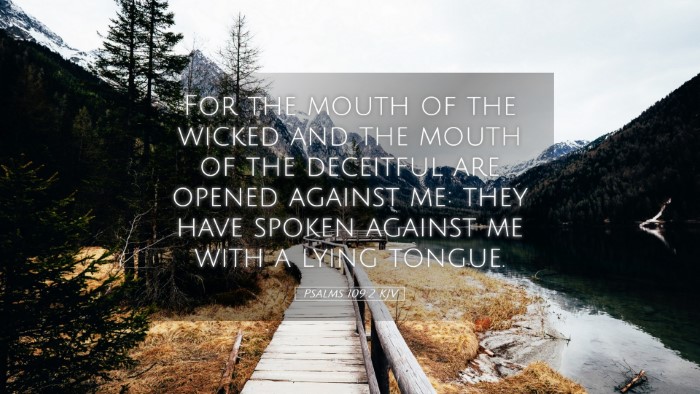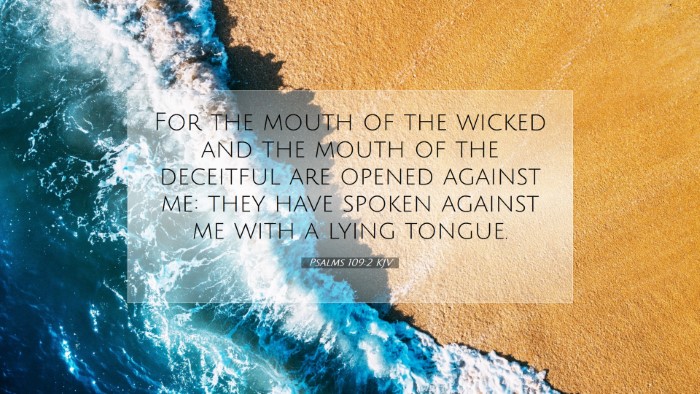Psalms 109:2 - A Commentary
Verse: "For the mouth of the wicked and the mouth of the deceitful are opened against me: they have spoken against me with a lying tongue."
Introduction
This poignant verse from Psalm 109 unveils the depth of distress experienced by the psalmist in the face of wickedness and deceit. The rich tapestry of commentary from historical theologians sheds light on various theological implications and practical applications for modern believers.
Contextual Analysis
Understanding the immediate context of this verse is crucial. Psalm 109 is categorized as an imprecatory psalm, where the psalmist appeals to God for justice against adversaries. The tone reflects a personal lament, suggesting a moment of deep betrayal and anguish.
- Historical Background: This psalm is often associated with David, reflecting his struggles during times of persecution and slander.
- Literary Structure: The psalm maintains a lament format, transitioning from personal anguish to a plea for divine retribution.
The Nature of Wickedness
Matthew Henry’s commentary brings forth the understanding of “the mouth of the wicked” as a metaphor for the adversarial powers that speak falsehoods and incite strife. These “mouths” symbolize not just individual oppressors, but also the collective force of malignity that threatens the faithful.
- The Challenge of Wicked Speech: The deceptive speech referenced here serves to undermine confidence and truth. It reflects the reality faced by many people of faith who encounter false accusations and slander.
- Theological Reflection: The presence of wicked speech in the world raises questions about the nature of evil. This verse emphasizes the spiritual warfare that engages believers daily.
Deceit and Its Consequences
Albert Barnes highlights the significance of deceitful speech in this context. He notes that such speech is not merely an attack on the psalmist but represents a broader cosmic struggle between truth and falsehood.
- Falsehood as a Weapon: Deceitful tongues wield the power to harm reputations and sow discord within communities. The psalmist’s lament is a universal cry that resonates with anyone who has faced unjust accusations.
- Implications for Community Life: The prevalence of deceit can fracture relationships, yet this challenging atmosphere compels the faithful to cling more closely to divine truth.
The Role of Lament in Worship
Adam Clarke emphasizes the importance of lament in fostering a genuine relationship with God. The act of voicing grievances in prayer is not merely cathartic; it serves as an invocation for divine intervention.
- Lament as a Spiritual Practice: By engaging in lamentation, the psalmist demonstrates that it is permissible to express pain, anger, and confusion directly to God.
- Transformation Through Lament: Such prayers can lead to spiritual transformation, moving the individual from a place of despair to one of hope and renewed trust in God’s justice.
Divine Justice vs. Human Suffering
The tension between human suffering and the pursuit of divine justice is a recurring theme in the psalm. Henry notes that while the mouth of the wicked may speak lies, God’s truth ultimately prevails.
- Trust in God’s Sovereignty: This psalm forces believers to confront their understanding of God’s justice in a world fraught with injustice. It invites reflection on the patient endurance required in times of trial.
- The Reality of Consequences: Reflecting on divine justice, Psalm 109 encourages the faithful to trust that God will confront wickedness in His time and way.
Lessons for Today’s Believer
As we delve into the insights provided by these commentaries, several key lessons emerge for contemporary application:
- Recognizing the Reality of Opposition: Believers must acknowledge the reality of opposition and deceit in their spiritual journeys, affirming the relevance of the psalmist's experience.
- The Call to Perseverance: Amid adversity, Christians are called to persevere, remaining steadfast in faith and prayer, much like the psalmist.
- Importance of Honest Dialogue with God: Lamentation, as highlighted in this psalm, allows an avenue for an honest dialogue with God, inviting the faithful to bring their hurts, fears, and hopes before Him.
- Hope in God’s Justice: Assurance of divine justice serves as a beacon of hope, reminding believers that even when the wicked seem to prevail, God's ultimate victory is assured.
Conclusion
Psalms 109:2 articulates a profound human experience of vulnerability in the face of wickedness and deceit. The insights gleaned from public domain commentaries by Matthew Henry, Albert Barnes, and Adam Clarke invite us to view lament not as a sign of weakness but as a means of engaging deeply with God’s presence amidst suffering. Ultimately, the psalm reminds us that while we may face opposition, we can remain anchored in the truth of God's justice and steadfast love.


